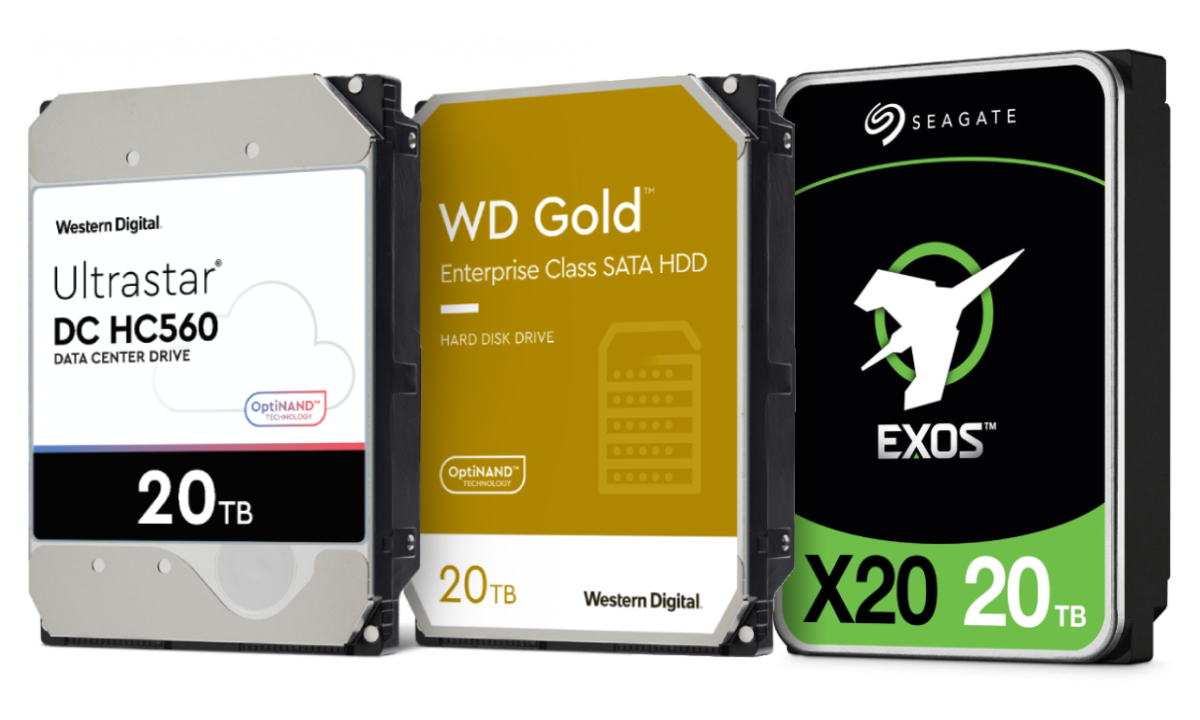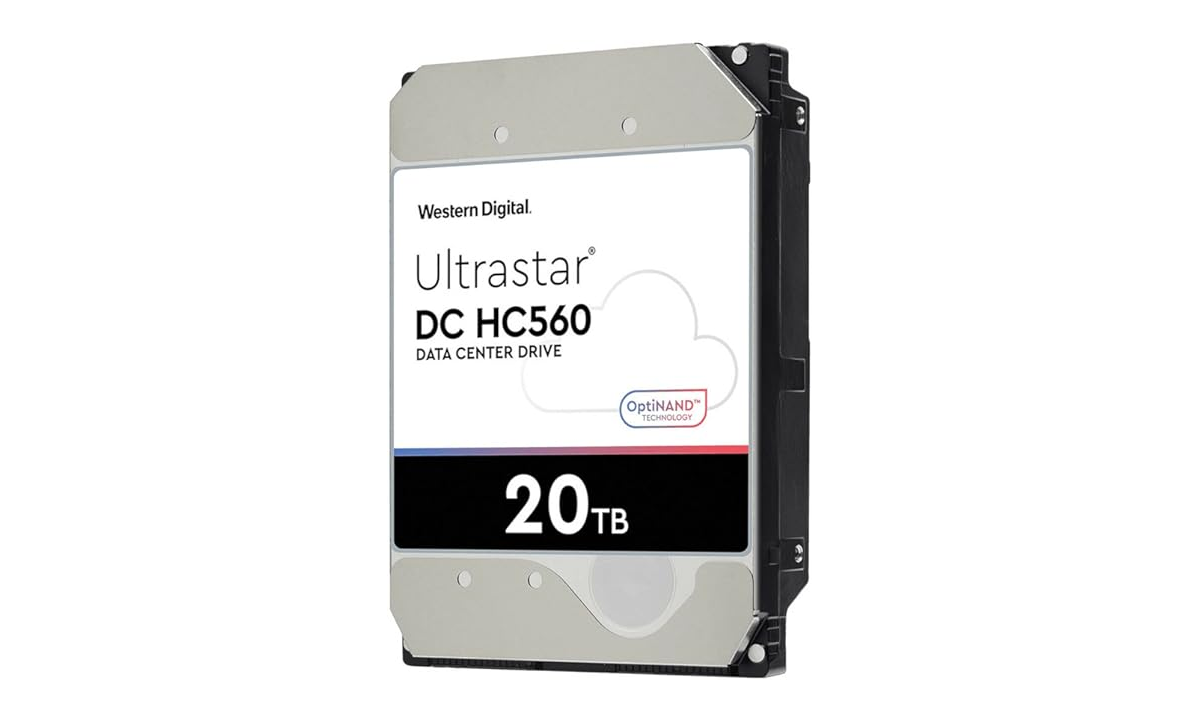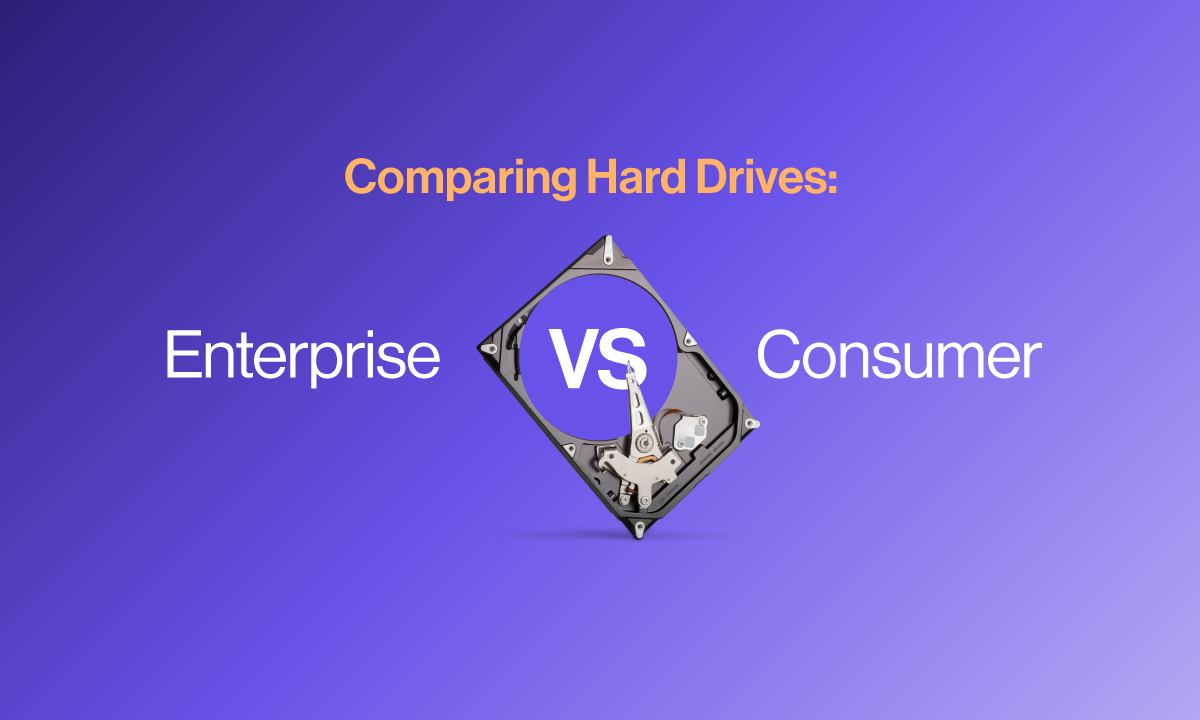Updated: 10-5-2023
Consumer vs Enterprise Hard Drives: Is an Enterprise HDD Worth It?
There is an age-old debate about SSD vs HDD, which you can read about here. However, if you've already decided on the HDD route for your particular needs, do you know the difference between an enterprise-level and consumer-level hard drive (HDD)?
What is An Enterprise HDD?
An enterprise HDD (Hard Disk Drive) refers to a type of hard drive designed and optimized for use in enterprise-level environments. These environments typically involve heavy-duty usage, such as data centers, servers, and storage systems where reliability, performance, and durability are crucial.
Typically, an enterprise HDD is not used as a standalone hard drive, but as part of a collective unit to operate entire servers with efficiency and regularity. This is not always the case, but it is a consideration when evaluating the worth of an enterprise HDD. They include various safety measures to ensure drives won’t fail randomly, hence the price hike compared with consumer HDDs.
What’s the Difference Between a Consumer Hard Drive & Enterprise Hard Drive?
Feature | Enterprise HDDs | Consumer HDDs |
|---|---|---|
Purpose | Designed for heavy workload and 24/7 operation with peak reliability | Meant for typical consumer use, not meant for 24/7 constant operation. |
Performance | Higher RPMs and faster data transfer rates | Standard RPMs and moderate transfer rates |
Reliability | Enhanced reliability and durability | Reliable for regular, non-intensive use |
MTBF (Mean Time Between Failures) | Typically higher and more predictable MTBF | Standard MTBF |
Warranty | Longer warranty periods (5 years) | Standard consumer warranty (2-3 Years) |
Error Recovery | Improved error recovery mechanisms | Basic error recovery features |
Cost | Higher cost due to advanced features | More budget-friendly for average consumers |
Capacity Options | Available in larger capacity options as high as 28TBs | Commonly available in consumer-friendly sizes under 10TB |
Vibration Resistance | Enhanced vibration resistance | Basic vibration resistance |
Power Consumption | May have higher power consumption | Standard power consumption |
Use Case | Compatible with any system but optimized for enterprise use. | Compatible with standard consumer systems not ideal for enterprise use |
Both types of hard drives can be slotted into either use case; enterprise drive for personal use, and consumer drive for enterprise use if need be. However, enterprise drives do serve their purpose for server use. Be aware that constant 24/7 use of a consumer drive can preemptively deteriorate the drive causing a sooner failure. On the other hand, enterprise drives are pricier for their added benefits.
- A consumer HDD is designed for PCs and laptops for relatively dense physical storage
- An enterprise HDD is engineered for servers also for dense physical storage but at a higher capacity
If you are looking for a hard drive to run a server, though, then it is worth weighing all the pros and cons presented by an enterprise HDD. For example, if reading and writing speeds are important to your business and this decreased downtime is worthwhile, then an enterprise HDD may be worth looking into.

Having a backup of all your files and storage is incredibly important. Being able to set up a RAID configuration with your enterprise HDD needs to be high on your priority list to truly consider it as an option. Your server having multiple back-ups will go a long way to reducing downtime if something fails while giving you the peace of mind that everything on your server is safe, no matter what.
Since an enterprise HDD has been designed to run indefinitely, they usually have substantial warranties, typically ranging 3-5 years. To get the most out of your enterprise HDD, you need to be willing to invest in upgrading your server hard drive system within the range of your warranty. If you cannot imagine spending the cost of an enterprise HDD every 3-5 years for each hard drive you need, then an enterprise HDD might not be the best fit for your needs.
A quick follow up question to the conversation about warranty might be about how long a hard drive like this might last if the warranty can be up to five years.
How Long Do Enterprise Hard Drives Last?
Interestingly enough, the average lifespan of any hard drive, consumer HDD or enterprise HDD, is about three years, although many consumer-level hard drives can last longer if not continuously used. If this is the case, then it may be a question of how much you are willing to spend on your first investment of a hard drive since the warranty will keep replacing them for you once they begin to fail regularly.
Backblaze produces quarterly and annual reports on various server-related technology. In these studies, Backblaze has discovered that an enterprise HDD is slightly more likely to fail than a consumer HDD. HOWEVER, a consumer HDD and an enterprise HDD do not run at the same capacity at all times. Let’s talk about usage:
A consumer HDD is typically rated for a maximum workload in the range of 50TB per year whereas an enterprise HDD is rated for a maximum workload around 500TB per year! When you take this into consideration, these rates are actually skewed heavily in favor of the reliability of the enterprise HDD at over 10x the throughput over consumer HDDs.
Consumer vs enterprise HDD decisions truly come down to the amount you are willing to spend, how much you plan on using it, and how much reliability matters to you. A consumer HDD is more than feasible for your own personal desktop or laptop. It may even be an option for creating and controlling your own personal server.
Is An Enterprise HDD Worth It?
If you are looking for a long-term, tried-and-true solution for a more robust server, then an enterprise HDD is the best solution hands down.
They are more reliable, have been designed to carry heavy workloads while staying on indefinitely, and have better warranty coverage in the event of a failure.
All in all, an enterprise HDD is worth it for bigger projects. If you are willing to spend more money for more peace of mind, then they may be worth it for smaller projects or even personal us.
It also depends on how important the data being stored on it is to you. If you are running deep learning research on your system, you most likely don't want to see a hard drive failure wipe out any data or results. Enterprise level hard drives are definitely recommended for any business or organization with a demanding workload or housing sensitive and important data. Personal laptops or home systems can stay focused on consumer level hard drives since much of your work can be backed up on cloud-based networks/drives.
If you are looking for an enterprise HDD, we have a generous selection over on our product page. If we had to give our top recommendation, it would be the Western Digital Ultrastar DC HC560 20TB.

The Ultrastar DC HC560 HDD is a top of the line enterprise HDD with every feature imaginable for your personal projects (if you are looking to replace a consumer HDD) as well as the ability to perform optimally for larger enterprise server deployments. 20TB with the capacity for a 550TB workload annually coupled with a 5-year warranty, this enterprise HDD is one of our favorite picks.
Western Digital''s Ultrastar line also has newer and larger capacity drives now too with 22TB DC HC580 and the up to 28TB DC HC680.
Storage Is Essential for All Workloads
In general, an enterprise HDD is more expensive and geared towards larger projects; but the higher price tag shouldn't disqualify it from being a great option for other projects. If you are in the market for an enterprise HDD, definitely take a look at Western Digital and Seagate.
At SabrePC we are more than just a components and storage vendor. We configure fully configurable storage servers for your data center, business deployment, or home server/NAS!
Having reliable storage servers is important for any workload. To manage the data in a server, and distribute it to the workplace, organization, and facility require the utmost care in selecting the right drives, the right processing node, and the networking. Contact us today to learn more!



